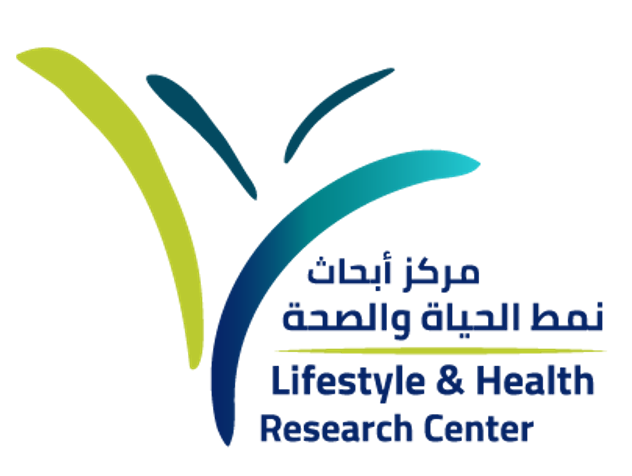The Lifestyle and Health Research Center (LHRC) at Princess Nourah bint Abdulrahman University has been officially established in 2019. It is the first research center in the region focusing exclusively on lifestyle behaviours and health, with emphasis on children, adolescents and women’s health. It intends to fill the gap in local and regional research on the promotion of healthy lifestyle and disease prevention using an interdisciplinary approach. The LHRC mission and objectives are perfectly allied with the Vision 2030 of Saudi Arabia that calls for, among other things, promoting healthy lifestyle of the Saudi population and enhancing their quality of life. The LHRC is located in the beautiful building of the Health Sciences Research Center (HSRC) and operates under the umbrella of HSRC and King Abdullah Bin Abdul-Aziz University Hospital (KAAUH).
Our Mission & Vision
Mission:
To provide a supportive and state-of-the-art environment that encourages high quality and impactful scientific research, provide training and mentoring, and promote health in all areas of lifestyle behaviors. These include physical activity, sedentary behaviors, dietary habits, sleep patterns and other lifestyle behaviors as they relate to health outcomes, using an interdisciplinary approach.
Vision:
To be a leading regional center of excellence in lifestyle behaviors and health research, with a focus on children, adolescent and women’s health and wellness.
Values:
- Credibility and quality in research, education and training
- Integrity, fairness and transparency
- Responsibility and accountability
- Supportive learning environment
- Sustainable development and collaboration.
Objectives:
- To conduct and promote lifestyle research (both laboratory-based as well as community/population-based studies).
- To provide high level training in lifestyle research skills for junior researchers, academic staff, post graduates, residents, interns and graduate students.
- To engage in public education and promotion of healthy lifestyle behaviors.
- To participate in knowledge transfer of lifestyle research findings into training packages that can be embedded into school and university curricula/extra-curricular programs.
- To establish an electronic resource for lifestyle research tools and instruments.
- To provide scientific evidence for public health programs, strategy and policy development as related to lifestyle behaviors and childhood and adolescent obesity.
- To increase the dissemination of information from lifestyle promotion research to improve the community’s knowledge on health promotion and disease prevention.
- To organize scientific conferences, workshops, and training courses and to attract visiting scientists and researchers.
Our Facility
State-of-the-Art Research Facilities
The Lifestyle and Health Research Center (LHRC) is housed in the Health Science Research Center’s modern building at Princess Nourah bint Abdulrahman University adjacent to King Abdullah University Hospital. It is located in the ground floor and occupies two large laboratories with additional office areas for administration, meeting rooms, statistical and research analysis and interview and assessment offices. The laboratories include a variety of equipment for conducting resting and graded exercise cardiopulmonary and metabolic function testing with integrated treadmill and ergometers, as well as other equipment for the assessment of resting energy expenditure and metabolic rate, musculoskeletal function, flexibility, body composition, balance, reaction time, blood lactate and glucose, blood pressure, electrocardiogram and physical activity and sedentary behaviors.
The LHRC also includes a kitchenette with a refrigerator, microwave oven and a sink to support dietary evaluation and nutritional research.In addition, there are nearby core labs capable of measuring a variety of blood and tissue biomarkers, including CBC, blood lipids, hormones, kidney and liver function, as well as genetic testing.
Cardiopulmonary & metabolic function equipment
- Fully automated desktop cardiopulmonary and metabolic assessment system with canopy for the assessment of resting energy expenditure and metabolic rate
- Two complete telemetry gas analyzer systems using breath-by‐breath technology with GPS receiver
- Research grade treadmill with safety harness
- Several bicycle ergometers, including recumbent ergometer and special ergometer for testing children
- 12-lead resting electrocardiogram
- 3-lead exercise electrocardiogram
- Heart rate variability testing devices
- Vital sign automated system for resting blood pressure, temperature and pulse rate.
- Automated external defibrillator (AED)
- Semi-private exam area for phlebotomy
Musculoskeletal function equipment
- Isokinetic machine employing concentric, eccentric and isometric all joints strength measurements
- Digital grip dynamometers for testing children and adult grip strength
- Jump assessment system with digital reading for testing vertical jump ability (muscular power).
- Weight training station, with exercise provision for chest, shoulder, back, thigh, arm strength training
Body composition equipment
- Dual-energy x-ray densitometry (DXA scan) for bone density and visceral fat assessment
- Segmental bioelectrical impedance analysis (BIA) for the noninvasive assessment of lean body mass, fat mass and body compartment water content
- Skinfolds callipers (both Harpenden and Lange types)
- Stadiometers and research grade weighing scales
Balance and reaction time equipment
- Stability platform for measurement of balance during dynamic movement
- Whole body digital reaction time measuring device with visual and sound stimuli
Flexibility, anthropometric and blood assessment equipment
- Biometric multi-joint range of motion kit, including large and small goniometers
- Portable flexibility boxes for sit and reach flexibility test
- Private room fully equipped with complete anthropometric kit for assessment of body length, breadth & circumference, including caliber for measurement of abdominal sagittal dimeter
- Research grade portable lactate analyzer meters for measurement of lactate from capillary sample
- Research grade portable glucose meters for measurement of blood sugar form capillary samples
Physical activity & sedentary behaviors assessment equipment
- Research grade portable accelerometers for the assessment of physical activity
- Research grade portable miniature accelerometers used specifically for the assessment of sedentary and sleep behaviors
- Electronic-based ATLS physical activity/dietary frequency questionnaires
Our Policies & Guidelines
Research Collaboration Forms
- Research Collaboration Form (RC-A-1)
- Research Collaboration Form (RC-B-1)
- Research Collaboration Form (RC-C-1)
- Research Collaboration Form (RC-D-1)
- Research Collaboration Form (RC-E-1)
Examples of research topics that can be a subject of collaboration with the LHRC
